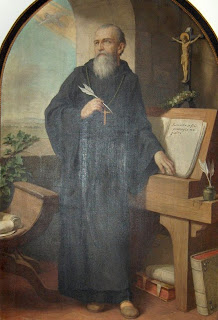Feast Day: April 29
Early Years
Catherine Benincasa was born in Sienna in 1347, she is the youngest in the 25 siblings.
At the age of six, while on the way home with her brother, she suddenly stopped still, gazing up into the sky. Her brother who had walked on ahead came back for her and grabbed her by the hand and at once Catherine woke up from her trance. The vision she was having was of Christ seated in glory with the Apostles Peter, Paul, and John. After that experience, little Catherine made a vow to herself that she will give her whole life to God.
At sixteen, she was allowed to become a Dominican tertiary which was customarily granted only to matrons or widows. She wore the habit but was permitted to live with her family.
Catherine continued to have visions, mystical experience and ecstatic flights. Soon she was known all over town, many thought her a saint but others see her as a fanatic.
During the dreadful outbreak of the plague, Catherine worked incessantly to relieve the plague-stricken people. She nursed them, prepared them for death and even buried them with her own hands. She also spent time with the prisoners and converted them.
Great Schism
It is impossible to explain here in detail the turbulent period in which Catherine lived and the work she has done during this complex political and religious turmoil. Suffice it to say that the traditional See of the Holy Father from the time of Saint Peter is Rome. However, the newly elected Pope Clement V chose to have his coronation at Lyons. He established his residence at Avignon and for seventy-four-year the popes had been residing there. The Holy Roman Empire and the Papacy were engaged in a sporadic struggle for power - Ghibelline was the name given to the imperial party in Italy and Guelph to the supporters of the Papacy. This is a period which historians called the Babylonian Captivity. Both popes excommunicated each other, launched troops against one another and Italy was bursting with internal strife. The Italians railed against the long absence of the popes from Rome as well as the meddling of France in papal administration.
Catherine labored to restore unity in the Church. Catherine was said to be an uneducated girl yet letter after letter was unleashed to popes, princes and leaders of Europe. She wrote to the Popes at Avignon, beseeching them to return to Rome. To Pope Urban (the second pope she had counseled and commanded), Catherine wrote to warn him to control his harsh and arrogant temper. She made stern calls aimed at Pope Gregory XI for church reforms and she kept on writing the Popes to labor for peace. St. Catherine also corresponded to the King of France urging him to form a crusade and end the dissensions in Christendom. She would boldly go to Avignon to see the Pope and say that he had been appointed by God to plead that the Pope return to Rome. St. Catherine of Siena was known for her ability to settle dispute and had build a reputation as a worker of miracles.
Stigmata
In 1375, Catherine accepted an invitation to visit Pisa. While making her Communion and gazing at the crucifix, five rays of blood descended and pierced her hands, feet and heart. The wounds remained as stigmata (wounds corresponding with those made in the hands and feet of the Our Lord, Jesus when he was crucified on the cross).
Finally, yielding to the pleadings of Catherine of Siena, Pope Gregory XI left Avignon in 1377 and returned to Rome thus ending the so-called Babylonian Captivity.
After having written 380 astonishing letters, Catherine died when she was only 33. Her body was found incorrupt in 1430.
Patronage:
Europe; Italy; against fire; bodily ills; people ridiculed for their piety; nurses; sick people; miscarriages
Prayer to St. Catherine of Siena:
O glorious St. Catherine of Siena,
you who embraced a life of prayer and service,
and through your deep love for Christ,
you became a beacon of light in a troubled world.
Help us, dear saint, to follow your example,
to seek God with all our hearts,
and to serve our fellow human beings
with compassion and love.
Intercede for us in times of turmoil and confusion,
that we may always find our way back to the path of righteousness,
just as you helped to guide the Church back to Rome.
St. Catherine, patroness of Italy and Europe,
pray for us and help us to live virtuously and seek God's will
in all that we do. Amen.
Reflection:
*After reading her biography and all the things she had accomplished, I was surprised to see that she was only 33 when she died. This reminds me of the song my niece sings in her nursery class “I can do all things through Christ who strengthens me!” Indeed her accomplishment was supernatural. On her own she could not have done it.
*St. Catherine defended the cause of God. Her political and social involvement is a practical application of her intense prayer life and religious convictions.
* St. Catherine of Siena's life reminds us of the transformative power of faith, prayer, and selfless service. Her commitment to God and her unwavering dedication to bringing about positive change in the Church and society serve as an inspiration to all of us. We can reflect on her life and strive to deepen our own faith, cultivate a life of prayer, and actively work towards making the world a better place through acts of love and compassion. St. Catherine's legacy encourages us to embrace the divine within ourselves and in others, seeking unity, peace, and the greater good in all our endeavors.
*One is never a Christian only for oneself. God made us for others.
*One is never a Christian only for oneself. God made us for others.











